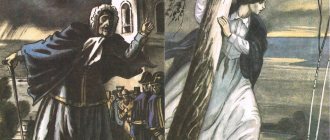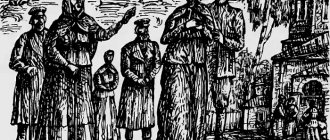Katerina
It’s not for nothing that Katerina is called “a ray of light in a dark kingdom.” Katerina is a young girl, thin, graceful and fragile. But she is like that only externally. Finding herself in Kabanikha’s house, she cannot put up with the established foundations. She does not accept Kabanikha’s world, her “dark kingdom.” Katerina actually has a strong character. She is never ready to change her principles, to wallow in cruelty, rudeness, rudeness, as Kabanikha does. Katerina has a sense of self-esteem, which greatly irritates Kabanikha. They are not destined to get along together.
Psychological pressure from Kabanikha on Katerina
The tragic image of Katerina in Ostrovsky's play "The Thunderstorm" invariably evokes the reader's sympathy and sympathy. The girl ends up in the Kabanov family by marrying Tikhon, the son of a merchant's wife. Before Katerina appeared in the house, her future mother-in-law completely imposed her will on everyone at home: her son and daughter Varvara. Moreover, if Tikhon is completely morally broken and is only able to follow the instructions of “mama,” then Varvara only pretends to agree, but always acts in her own way. However, under the influence of her mother, her personality was also deformed - the girl became insincere and double-minded.
The image of Kabanikha in the play “The Thunderstorm” is antagonistic to the image of Katerina throughout the entire play. It’s not for nothing that the daughter-in-law reproaches that her mother-in-law “eats her.” Kabanikha constantly insults her with far-fetched suspicions. It exhausts the soul with senseless compulsions to “bow to your husband” and “cut your nose.” Moreover, the merchant's wife appeals to quite plausible principles: maintaining order in the family; harmonious (as is customary in the Russian tradition) relationships between relatives; foundations of the Christian faith. In fact, Marfa Ignatievna’s influence on Katerina comes down to compulsion - to blindly follow her orders. Kabanikha wants to turn her into another subject of her home “dark kingdom”.
Clash of characters
Kabanikha is annoyed by Katerina’s meek confidence and unwillingness to obey the laws by which everyone in Kabanikha’s world lives. Katerina cannot live in this dark world. She confronts him. Believing in true love, she goes to Boris. But he betrays her. Katerina cannot return to Kabanikha’s house. Her decision and only way out was suicide. It is a kind of protest against the world in which the inhabitants of the city remained to exist. Being a real ray of light in this dark kingdom, Katerina could not get used to the world of lies, hypocrisy, cruelty in which she had to live. But even suicide did not return Kabanikha to good thoughts. She is glad about this tragic event, because now no one will resist her in her cruel and dark abode.
“Katerina and Kabanikha - two poles of Kalinov’s world”
Katerina and the boar are two opposite people from the same family. Kabanikha is the mistress of the “dark kingdom”. All the characters in this play are either victims of this kingdom, like Tikhon and Boris, or have adapted to it, like Varvara and Kudryash. Katerina is the only character who has not come to terms with her place in this world. Katerina is an outwardly fragile, tender and open-to-feeling young woman, not at all as defenseless as she seems at first glance. She is strong inside, she is a fighter against this “dark kingdom”. Katerina is a girl who is able to stand up for herself, who is capable of much for the sake of her love. But she is alone in this world, and it’s hard for her, so she is looking for support. It seems to her that she finds support in Boris. And she strives for him in every possible way, no matter what. She chose him because Boris stood out from all the young people in this city, and they both had a similar situation. But in the finale, Boris abandons her, and she is left alone against the “dark kingdom.” To accept and return to Kabanikha’s house meant not to be herself. Suicide is the only way out. Katerina passes away because she does not accept this world - the world of Kabanikha, Dikiy, Tikhon and Boris. Kabanikha is a completely different person, she is the opposite of Katerina. She is completely satisfied with the world in which she lives. No one ever dared to contradict her, but then Katerina appears, unwilling to put up with Kabanikha’s rudeness, rudeness and cruelty. And therefore Katerina, with her self-esteem, constantly irritates Kabanikha. A conflict is brewing between Katerina and Kabanikha. This conflict does not explode until there are reasons for it. And the reason is Katerina’s confession of cheating on her husband. And Katerina understands that after this her life is over, because Kabanikha will then completely bully her. And she decides to commit suicide. After the death of Katerina, Kabanikha remains satisfied, because now no one will resist her. Katerina's death is a kind of protest against this world, a world of lies and hypocrisy, to which she could never get used to. But Katerina and Kabanikha have something in common, because they are both able to stand up for themselves, both do not want to put up with humiliation and insult, both have strong characters. But their reluctance to be humiliated and insulted manifests itself in different ways. Katerina will never respond to rudeness with rudeness. Kabanikha, on the contrary, will try in every possible way to humiliate, offend, and bully a person who says something unpleasant in her direction. Katerina and Kabanikha have different attitudes towards God. If Katerina’s feeling for God is something bright, holy, inviolable and highest, then for Kabanikha it is only an external, superficial feeling. Even going to church for Kabanikha is only to make the impression of a pious lady on those around her. The most suitable comparison between Katerina and Kabanikha is something light and something dark, where Katerina is light and Kabanikha is dark. Katerina is a ray of light in the “dark kingdom”. But this “ray” is not enough to illuminate this darkness that in the end it fades out altogether.
Why is the conflict between Katerina and Kabanikha inevitable?
A.N.
Ostrovsky is a great Russian writer. He created many dramatic works and plays. But his most famous work is, naturally, “The Thunderstorm”. In it, the writer raises the current problem of the relationship between fathers and children using the example of Katerina and Kabanikha. In the work of A. N. Ostrovsky, two opposites collided. Kabanikha has her own old foundations and moral principles; she follows outdated patriarchal orders, demanding Katerina’s unconditional submission. Katerina, in turn, is a fragile and defenseless girl. She does not want to confront Kabanikha; the girl is looking for support and support in a reliable person. However, Boris refuses her, Katerina does not have anything left in this world that could hold her. She does not want to return to Kabanikha’s house, so her only option is suicide. Katerina does not want to stay in this world where Kabanikha is, and after cheating on her husband, she realizes that after this confession her life is over, because Kabanova will then completely bully her. The girl's death is a kind of protest against a world dominated by lies and hypocrisy. Katerina would not have been able to get used to the place where she lived. After the death of the heroine, Kabanikha remains satisfied and in this conflict she is the winner. Thus, the author showed us that the conflict between Kabanikha and Katerina is inevitable, because these are two opposites that would not find a common language, because each heroine has her own values and morals. 58.1. “Why is a conflict between Katerina and Kabanova inevitable?”
Kabanikha and Katerina are complete opposites, absolute antonyms in all respects. Kabanova is a very domineering and unpleasant woman, similar in this way to her brother; in literature, their images were given the name “tyrants of Russian life,” which immediately indicates their life principles and positions. Kabanova did not accept any behavior from those around her other than obedience to her rules; even her son, an adult man, cannot say anything against his mother and allows her to invade his life and change, dispose of it as she pleases. Katerina was brought up with love and care, a freedom-loving girl with her own desires and opinions, she herself says about herself “like a bird in the wild.” And now this bird falls into the clutches of a kite in the person of Kabanikha. The bird is not just locked in a cage, but is humiliated, mocked, and treated as nothing, covering it up with compliance with the rules from Domostroi. Katerina is trying to find happiness by cheating on Tikhon, her husband, with Boris. She fell in love with someone else rather because he was a breath of fresh air for her in this stuffy kingdom with tyrant throne-bearers. Katerina, unable to bear the shame, confessed everything to her husband, after which Kabanikha hated the girl more than ever and began to torment her so much that her daughter-in-law decided to commit suicide. Katerina’s departure from life is the fault of all of them, and Kabanikha for tyranny, and Tikhon for weak character, and Boris for vile deeds and words. Kabanova emerged from the conflict as a winner, and she was more than satisfied with this outcome; this woman did not feel any pity or guilt and is unlikely to ever feel it. Ostrovsky in his drama “The Thunderstorm” shows the tragedy of society not only of that time, this problem is quite relevant now and most likely will be so in the future.
Why is a conflict between Katerina and Kabanikha inevitable?
The controversial image of Marfa Ignatievna Kabanova
The play is based on a comparison of two strong opposite images: Ekaterina and Marfa Ignatievna Kabanova. In fact, they have a lot in common: the primacy of the patriarchal world, the maximalism inherent in both, strong characters. Despite their religiosity, they do not compromise and are not inclined to mercy. This is where their similarities end. They are at different poles of the patriarchal world. Kabanikha is an earthly woman; she is concerned about maintaining order down to the smallest detail. She is not interested in human relationships. The patriarchal way of life for Katerina is characterized by dreaminess and spirituality.
The image of Kabanikha in the play “The Thunderstorm” is one of the central
. She is a widow left with two children, Varvara and Tikhon. She can rightly be called harsh and merciless for Tikhon’s reproaches that he loves his mother less than his wife Katerina, and constantly strives to escape his mother’s will.
The predominant personality trait of Kabanikha can be called despotism, but not extravagance
. Each of her demands on others, be it her son or daughter-in-law, is subject to the moral and everyday code of “Domostroy”. Therefore, she firmly believes in the principles that it speaks of, and considers their strict adherence to them correct. Turning to Domostroevsky concepts, she believes that children should honor their parents so much that the will of the children does not matter at all. Relations between spouses should be built on the wife’s fear of her husband and unquestioning submission to him.
Kabanikha contributed to Katerina’s suicide
It is the image of Katerina Kabanova in Ostrovsky’s play “The Thunderstorm,” constantly bullied by her mother-in-law, deprived of all rights and intercession, that gives tragedy to Ostrovsky’s play. None of the readers doubt that her suicide is the result of the unfavorable influence of her mother-in-law, constant humiliation, threats, and cruel treatment.
The situation is aggravated by the fact that Katerina had already previously stated that she would settle scores with her unhappy life. Marfa Ignatievna, who was well aware of everything that was going on in the house, could not help but know this. Was there any direct intent on the part of the mother-in-law to drive her daughter-in-law to suicide? Hardly. Rather, Kabanikha thought of “breaking” her, completely, as she had already done with her son. As a result, the merchant's family collapses: her daughter Varvara accuses her of directly contributing to the tragedy and leaves home. Tikhon goes on a drinking binge...
However, the hard-hearted Marfa Ignatievna does not repent even after this. For her, the “dark kingdom”, manipulating people is more important than family, more important than morality. This conclusion can be drawn from the episode of Kabanikha’s revealed hypocrisy even in this tragic situation. The merchant's wife publicly bows and thanks the people who retrieved the body of the late Katerina from the Volga. However, then he declares that she cannot be forgiven. What could be more anti-Christian than not forgiving a dead person? This, perhaps, can only be done by a real apostate.




